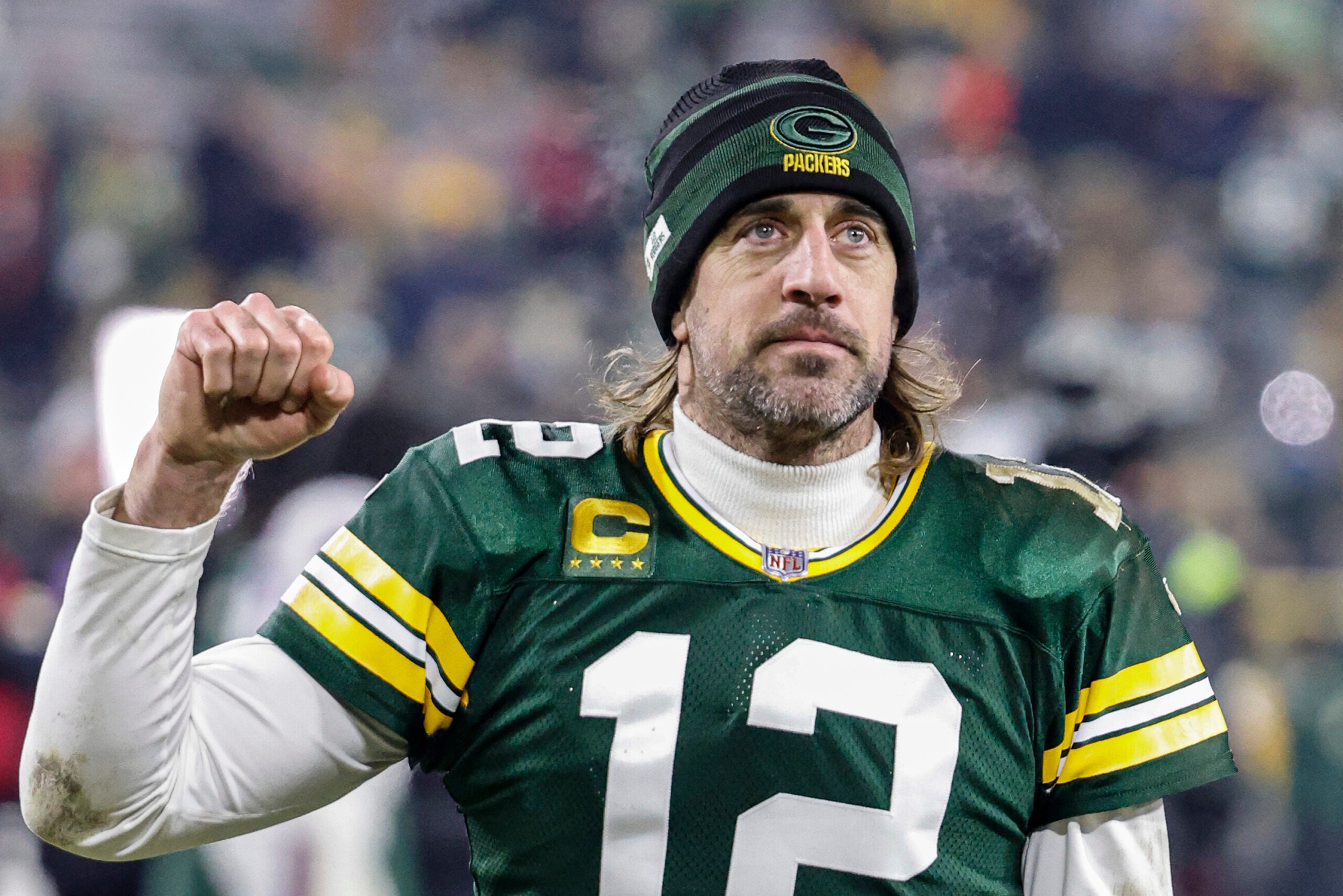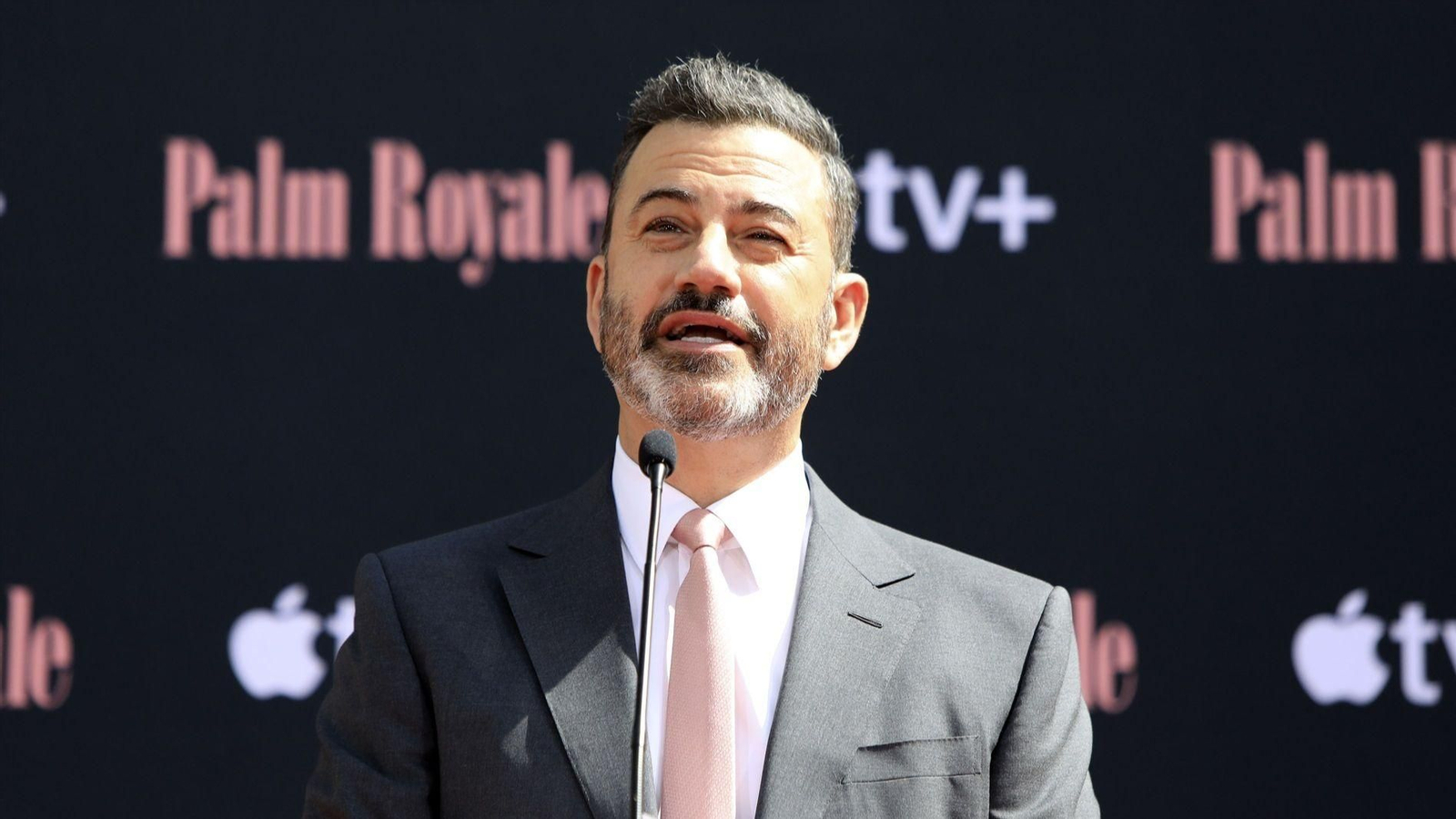m Star Aaron Rodgers Demanded His Exile—Then Kimmel Stripped Down His Show and Delivered Savage Words That Just Halted Rodgers’ Entire Career
The cultural battlefield of American media is a chaotic place, littered with the corpses of careers lost to outrage and cancellation. For a brief, terrifying period, the national narrative suggested that late-night host Jimmy Kimmel was the latest, highest-profile casualty. His executioner, a man wielding not a weapon but a colossal platform and immense cultural cachet, was NFL superstar Aaron Rodgers. The battle was not fought on a field or a stage, but in the hostile, unforgiving arena of viral outrage, and for hours, it looked like the quarterback had landed the decisive, career-ending blow.
Rodgers had gone on air with the calculated fury of a man ready to wage a full-scale culture war. He branded Kimmel a “toxic force” and mobilized his legion of followers, demanding not just an apology, but a complete exile. The call to action was simple and ruthless: boycott Kimmel, boycott the entire network, demand corporate sponsors pull their funding until the host was erased from public life. The internet responded instantly. The hashtag #BoycottKimmel trended at lightning speed across every digital platform. Political commentators and media critics, seizing the narrative, declared Kimmel’s career finished, a victim of the very cancellation culture he often mocked. Sponsors panicked. Network executives whispered worriedly behind closed doors. The consensus was overwhelming: Rodgers had swung first, and Jimmy was down for the count.
But then came the broadcast—a moment that immediately earned its place in late-night history, not for comedy, but for pure, surgical defiance.

There was no elaborate opening, no jazz band fanfare, no celebrity guest designed to mask the tension. Jimmy Kimmel appeared live from an unexpected, stripped-down setting: his office. The camera was a single, unforgiving eye staring directly into his face. He wore no smile; his tie hung loose, a subtle visual cue of the high stakes and the lack of pretense. On the desk before him sat a stack of cue cards, untouched—a powerful signal that the prepared script had been tossed out.
For twenty, excruciatingly long seconds, Kimmel did not speak. The silence in the room, amplified by the heavy quiet of the unadorned production, was suffocating. It was a silence so heavy it felt like an acknowledgment of surrender, a moment of national bracing for an apology, perhaps even a tearful resignation. Millions of viewers leaned forward, suspended in the unbearable tension of a man facing the end of his career.
Then, the tension broke with a sudden, jarring physical act. A sharp crack resonated through the microphone as Kimmel slammed his stack of papers onto the desk—a punctuation mark in the stillness. He raised his eyes, steady and unblinking, and spoke. The words were delivered not in a comedic tone, but with the measured finality of a jury delivering a verdict.
“Aaron Rodgers wants to erase me. Fine. But you don’t erase comedians. We outlast quarterbacks. When the helmet comes off, you’re forgotten. When the lights go out, we’re still here, making people laugh.”
The line—unforgettable, raw, and defiant—detonated across the cultural landscape. It was a complete reversal of the narrative, executed in a devastating seven-word clause: “We outlast quarterbacks.” The studio audience gasped. The control room, according to whispers from network insiders, froze, with a producer frantically issuing the command: “Don’t cut. Stay wide.” The clip was already tearing across Twitter and TikTok before the sentence had even finished, achieving instant virality.

The immediate impact was a stunning flip of the digital script. The hashtags changed in real time: #KimmelStrikesBack, #RodgersStunned, and #ComediansOutlast dominated social media feeds. Commentators, replaying the clip without interruption, called it “the coldest line in late-night history.” One viral comment perfectly summarized the unexpected shift of momentum: “Rodgers threw the punch. Kimmel landed the knockout.”
Kimmel’s supporters flooded social media with praise, celebrating the unexpected defiance. “That’s the Jimmy we’ve been waiting for,” one fan wrote. “He didn’t need a stage. He needed ten seconds.” Another immediate reaction pointed to the lasting power of the statement: “Comedians outlast quarterbacks. Put it on a T-shirt.” Even members of Rodgers’ own fan base were forced to concede the gravity of the shift in balance. A post on Reddit, attracting thousands of upvotes, put it bluntly: “Rodgers made headlines. Kimmel made history.”
The fundamental power of Kimmel’s counter-punch lay in its clarity and its reframing of the cultural argument. Rodgers had come armed with generalized outrage and demands for accountability—a powerful, but ultimately abstract, weapon. Kimmel countered with a deeply personal, unforgettable truth about the nature of celebrity and legacy. The silence created the tension, the papers slamming down was the signal, and the line itself stripped the NFL star of his perceived cultural immortality, reducing him to a mere athlete who would, inevitably, be forgotten once the lights dimmed. For the first time, the superstar quarterback looked demonstrably rattled in the high-stakes cultural arena.
The commercial reverberations were swift. Sponsors who had previously wavered suddenly began to recalculate the risk profile. Civil liberties groups publicly applauded Kimmel’s sudden, impassioned stand as a necessary defense of free speech and comedy. MSNBC called the moment “the clearest defense of comedy as free speech in a generation.” Even rival outlets like Fox News, while attempting to spin the event as mere “performance art,” found themselves repeatedly replaying the footage to meet intense audience demand.

In living rooms and union halls across America, the reaction was deeply visceral. People cheered at their screens. The clip became a rallying cry, shared not just by late-night viewers, but by college students, activists, and even teenagers who had never before engaged with the host’s work. The moment of viral brilliance had successfully transcended the political and media bubble, proving that in a culture war fought with noise, the deadliest weapon is often a moment of silence, punctuated by a single, undeniable, devastating truth.
Rodgers will, without question, secure his place in the Hall of Fame as an iconic quarterback. But now, his public, off-field legacy carries a profound shadow: the night he attempted to erase a comedian, only to witness that comedian rise from the canvas and humiliate him with a surgical strike delivered in less than a minute. Jimmy Kimmel, stripped of his usual stage and written off as finished, delivered a line that froze a nation and completed the most spectacular and critical comeback of his career. In those ten seconds, survival became victory, and humiliation became an enduring legend.


